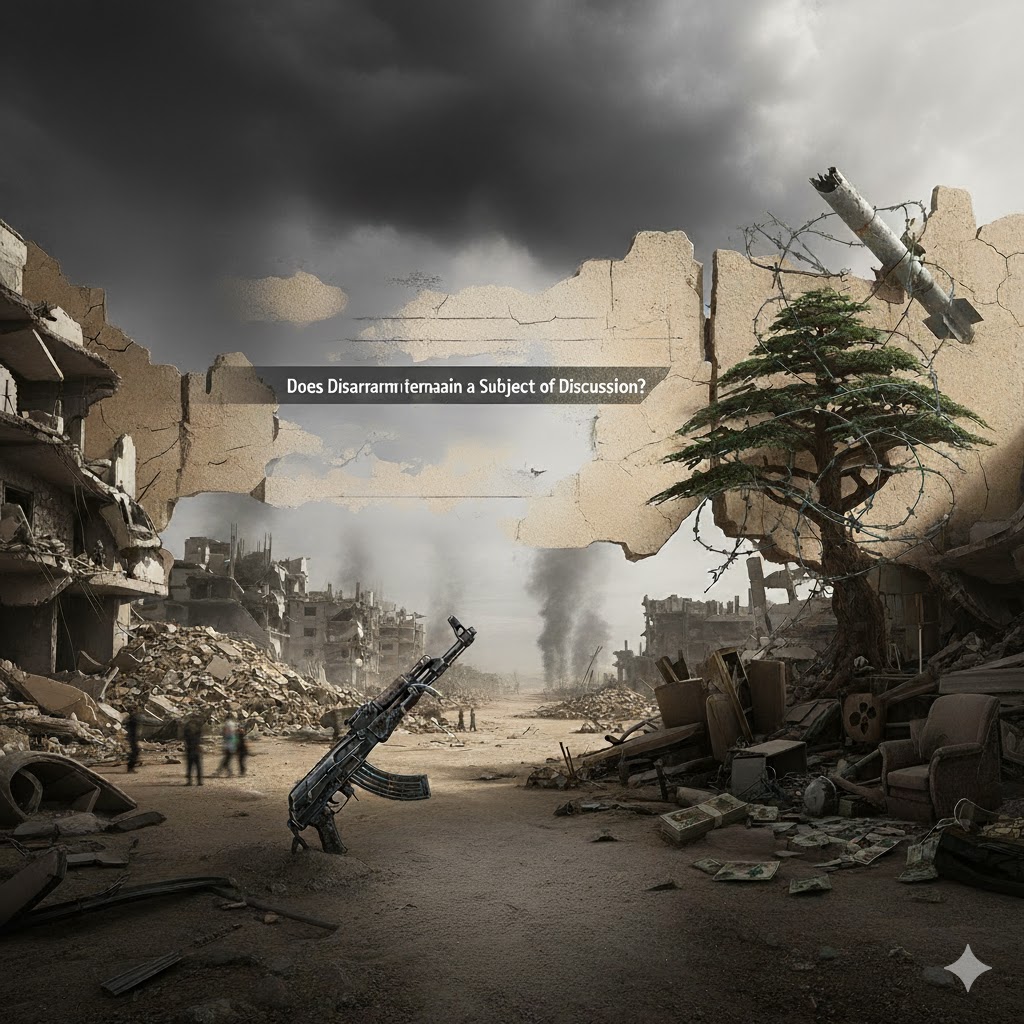How Is Disarmament Still a Matter of Debate?
Nadim Koteich/Asharq Al Awsat/October 21/2025
أيُعقَل أن نزعَ السلاح ما زال مادة للنقاش؟
نديم قطيش/الشرق الأوسط/21 تشرين الأول/2025
الدهشة والاشمئزاز هما ما يثيرهما الجدال المزمن بشأن نزع سلاح المقاومات في غزة ولبنان، كأنَّ الاحتفاظ به يحمل أي وعدٍ بتحقيق ما عجزت عنه عقود من تجربة الميليشيات.
ولم يحُل دون هذا العناد بشأن وهم السلاح، الدمار العملاق، والخسائر البشرية التي تفوق أي مكتسبات متخيَّلة. والحال: بات السؤال الجوهري ليس ما إذا كان نزع السلاح ممكناً؛ بل: لماذا نستمر في التعامل معه كخيار قابل للتأجيل، بينما البدائل المتاحة تتضاءل مع كل جولة عنف جديدة؟
أحال «طوفان الأقصى»، بوصفه نتيجة موضوعية لجنون السلاح، غزة، إلى مساحة رملية تحتضن 55 مليون طن من الأنقاض، تحتاج إلى عامين لإزالتها، بينما تشير سيناريوهات أكثر تشاؤماً إلى 10 سنوات، بتكلفة 50 مليار دولار كحد أدنى، بينما تتطلب إعادة إعمار القطاع 70 مليار دولار، وفق تقديرات الأمم المتحدة، هذا إلى جانب الخسائر البشرية التي تراوحت بين 40 و60 ألف قتيل وعشرات آلاف الجرحى والمعوقين والأيتام.
وفوق كل ذلك، يصر السلاح وأهله على أنه الرادع والحامي، منكرين أنه السبب الأول في استمرار المأساة وتأخير إعادة الإعمار، والعائق الفعلي أمام أي فرصة للخروج من الأزمة، بعد أن بات العالم يربط بين نزعه وبين فتح صفحة جديدة في حياة الفلسطينيين.
في لبنان، المعطوب اقتصادياً بفعل أعنف انهيار اقتصادي في العالم منذ 150 عاماً، تقاس تكاليف حرب «إسناد غزة» بأضعاف أضعاف بياناتها الفعلية. وتقاس أكثر، بإلحاح السؤال الذي أعيد طرحه على اللبنانيين بشأن استحالة نهوض بلدهم، ما لم تُحَل مشكلة سلاح ميليشيا «حزب الله»، حلاً ينهي تفردها بقرار الحرب، وقرار جر البلد إلى صراعات لا صلة لها بمصالح أغلبية أبنائه.
ومع إلحاح اللغو الدعائي الشائع في غزة وفي لبنان، عند أهل السلاح، على أن هذا الأخير، وحفظه، هو بمثابة حفظ «خيار المقاومة»، تكشف الوجهة العريضة لخطاب «حماس» و«حزب الله»، عن مفارقة كبرى، مفادها أن هذا السلاح انتقل عندهما من كونه يُمثِّل «خياراً وجودياً» غير محدودٍ بزمن، إلى مجرد «ورقة مساومة» ذات ثمن سياسي وجغرافي مُحدَّد. فبات «حزب الله» الذي كان سلاحه بمثابة وجوده، يشترط الانسحاب من مزارع شبعا والنقاط المحتلة مقابل نزعه، في حين تطالب «حماس» بالدولة الكاملة السيادة كمقابل لتسليم ترسانتها.
تحوُّل كهذا لا يكتفي بمناقضة الأساس الآيديولوجي لـ«المقاومة المفتوحة»، المبهرة في قدرتها على التنقيب عن المظالم وربطها بآفاق أبدية للصراع؛ بل يؤشِّر أيضاً، إلى أن كلاً من الفصيلين يستشعر عمق الهزيمة الاستراتيجية التي أصابته وأصابت خياراته؛ حيث فاقت تكلفة السلاح كـ«عبء استراتيجي» جدواه الآيديولوجية، وأصبح بقاؤهما السياسي مرهوناً بـ«صكوك تخلٍّ» تُوقَّع على طاولة الوسطاء.
وتظل الوجهة الأكثر قتامة لهذا الإقرار الضمني بالهزيمة، والمدفوع بغريزة البقاء القصوى، لدى «حزب الله» و«حماس»، المبالغة في تجيير قوة هذا السلاح لضبط الدواخل الفلسطينية واللبنانية والاستقواء عليها. فعمليات التقتيل الوحشية في غزة بهدف إعادة تأسيس الهيمنة الأمنية والسياسية على الفلسطينيين، تتوازى مع ما تشهده الساحة اللبنانية من إعادة وقحة لتأسيس علاقات الهيمنة والبلطجة عبر بقايا السلاح، كما تشير أكثر من واقعة استعراضية مؤخراً.
والحال: يدفع الناس ثمن مغامرات السلاح، ويطلب منهم -فوق ذلك- تسديد فواتير إنكار الهزيمة من كرامتهم وأمنهم وسوية عقولهم؛ إذ إن المطلوب إنكاره واضح وضوح الشمس.
يمهد ما سبق وصفه للاعتقاد بتهاوي الادعاء، بأن «حفظ السلاح هو حفظ لحقوق الشعوب»؛ إذ بات نزع السلاح هو الشرط لخدمة تلك الحقوق فعلياً. فبإزاء أن هذه الترسانات العسكرية المهزومة لم تعد تخدم إلا مصالح الفصائل نفسها وميزان بقائها الداخلي، أصبحت حقوق الفلسطينيين واللبنانيين في التعليم، والاقتصاد، والأمن، والسيادة الحقيقية، مُعلَّقة بشرط وحيد ومُلِحٍّ: نزع هذا السلاح أولاً، وإعادته إلى سيادة الدولة؛ حيث بقايا دولة في لبنان، وإلى القرار الوطني الجامع الذي لا بد من إعادة ترميمه في فلسطين.
صحيح أن القبول بنزع السلاح، أو تحييده، يُرضي جانباً من شروط إسرائيل، ويُحقق مطالبها الأمنية، ولكنه -في جوهره- يُحقِّق وبشكل أوسع شروطاً ملحة لمستقبل الفلسطينيين واللبنانيين. فما يفيد أغلبية الفلسطينيين واللبنانيين على المدى الطويل، حتى لو أفاد الخصم جزئياً، هو الخيار الأكثر أخلاقية، في مقابل تمسك أقلية موهومة بتدمير ذاتها والآخرين، من أجل إيذاء جزئي للخصم فقط.
لقد درجت فاتورة الدم والخراب التي يدفعها الناس في غزة ولبنان، أن تكون أكبر بما لا يقاس من أي مكاسب تكتيكية تُسجَّل ضد إسرائيل، على نحو ينبغي أن يذكِّرنا ببداهة لا بد منها، وهي أن مكاسب بناء الدولة والسلام الداخلي هي المكتسبات التي تتضاءل أمامها خسائر الخصم ومكاسبه في آن.
How Is Disarmament Still a Matter of Debate?
Nadim Koteich/Asharq Al Awsat/October 21/2025
The chronic persistence of the debate over disarming the resistance factions in Gaza and Lebanon is as nauseating as it is astonishing. Given the endless controversy, one would think that there was still hope that these factions could succeed after decades of failure.
The harrowing scale of human and material losses, which far outweigh any perceived gains, has not reduced this intransigent attachment to the illusion of armament. The essential question is no longer whether disarmament is possible. The question is why we continue to approach it as an option or a step that can be postponed, even as every new round of violence restricts the alternatives available to us.
The “Al-Aqsa Flood,” as the predictable outcome of armament’s insanity, turned Gaza into a flat territory under 55 million tons of rubble. It would take at least two years to clear the debris. More pessimistic estimates assess that it would take a decade, and a cost of no less than 50 billion dollars. Rebuilding the Strip, according to United Nations estimates, would require around 70 billion dollars. The human toll, between 40,000 and 60,000 casualties, and tens of thousands more wounded, disabled, or orphaned, is unfathomable.
Yet, the factions that bear these arms insist that they are a deterrent. They refuse to recognize that these arms are evidently the primary reason for this ongoing tragedy, reconstruction delays, and the lack of hope for recovery. The world now links disarmament to the opening of a new chapter in Palestinian life.
In Lebanon, which had already been crippled by what has been described as the most severe economic collapse in 150 years, the costs of the “support war” cannot be determined by figures. Rather, it is found in the answer to an urgent question being posed to the Lebanese once again: can their country ever rise up without addressing the arms of Hezbollah to ensure that the party does not make decisions of war and drag Lebanon into conflicts that serve none of its people’s interests?
The factions in Gaza and Lebanon constantly proclaim that maintaining their arms safeguards the “choice of resistance.” Despite their relentless propaganda, however, the general trajectory of Hamas and Hezbollah’s discourse exposes flagrant contradictions. Their weapons have gone from being a lifelong “existential choice” to a mere “bargaining chip” that could be traded for a clearly defined political and geographic price. Hezbollah, whose arms were once its essence, now says it could disarm on the condition that Israel withdraw from the Shebaa Farms and the points it occupies on the border, while Hamas demands a fully sovereign state as the price for handing over its arsenal.
These shifts not only go against the ideological foundations of “permanent resistance”, which once had a remarkable knack for unearthing grievances and tying them to an eternal struggle, but also signal that both factions have realized the severity of their strategic defeat. Their approach has become untenable, as the “strategic burden” of maintaining arms now outweighs their ideological draw, and their political survival has become contingent upon “renunciation agreements” concluded through mediators.
The darkest manifestation of their implicit admission of defeat, which is driven by a survival instinct, has been their aggravating use of these arms to control and subjugate their own societies. Hamas has been conducting brutal assassinations in Gaza aimed at re-establishing political and security dominance over Palestinians. In parallel, Hezbollah is shamelessly seeking to reassert its capacity to intimidate and bully others with the remnants of arms, as recent theatrics have vividly shown.
The general population continues to pay the price for these misadventures, and they are then made to cover the cost of denying defeat with their dignity, safety, and sanity, while the reality they are asked to deny could not be clearer.
Accordingly, the claim that “maintaining arms means safeguarding the rights of the peoples” has become a farce. Disarmament has become the ultimate necessary condition for attaining these rights. These factions now serve nothing but their own interests and their domestic leverage. The rights of Palestinians and Lebanese to education, the economy, security, and genuine sovereignty now hinge on one urgent and singular task: disarming these forces and restoring authority to the state – the fragments of a state in Lebanon and the development of unified national authority in Palestine.
It is true that accepting disarmament or even the neutralization of weapons aligns with Israel’s objectives and addresses its security concerns. Nonetheless, it would do far more to help the Palestinian and Lebanese peoples meet their pressing needs. The majority of Palestinians and Lebanese would benefit in the long run, and thus, even if it were a win for Israel, disarmament is ultimately the more ethical choice. The alternative is the self-destructive obstinacy of a deluded minority willing to destroy themselves and others merely to inflict a minor wound on the enemy.
For too long, the blood and devastation in Gaza and Lebanon have far exceeded any tactical “gains” the factions have made in their wars with Israel. This should remind us of a basic truth: state-building and domestic peace are victories before which the enemy’s losses and gains fade into insignificance.























